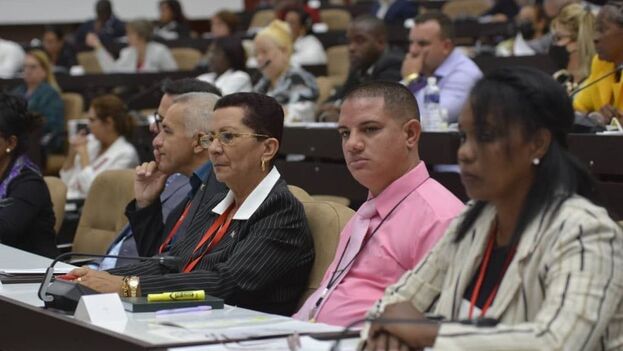
![]() 14ymedio, Havana, December 15, 2022 — The indifference of some National Assembly delegates made it impossible to know if they approved, were abstaining or simply were not interested in the proposed expropriation law. When called upon by Esteban Lazo to to cast their votes for the legislation, some members kept their hands under the table while others ignored the body’s president, focusing instead on their cell phones.
14ymedio, Havana, December 15, 2022 — The indifference of some National Assembly delegates made it impossible to know if they approved, were abstaining or simply were not interested in the proposed expropriation law. When called upon by Esteban Lazo to to cast their votes for the legislation, some members kept their hands under the table while others ignored the body’s president, focusing instead on their cell phones.
Without bothering to look up and count the votes, Lazo simply ignored the errant delegates and declared the bill to be “approved unanimously.” The chamber applauded the result with the same disinterest.
The Law on Expropriation for Reasons of Public Need or Social Benefit is part of a legislative program sponsored by the regime. The measure, a series of legal initiatives conveniently ratified by parliamentary delegates, is intended to further codify the country’s 2019 constitution.
Though the government had been unusually low-key about the proposed law, avoiding undue publicity, this has not prevented suspicions being raised or questions being asked about the future implications of the legislation given the mass exodus the country is currently experiencing.
Meisi Bolaños Weiss, the Minister of Finance and Prices, says the new law is an attempt to establish legal guarantees and forms of compensation, and to address other issues related to the process of expropriation by the state. She noted that the committee which drafted the legislation – made up of various judicial and economic bodies as well as faculty from the University of Havana School of Law – had worked hard on the text, aware of the sensitivity of the issue.
The law, she says, expands on Article 58 of the current constitution, which mentions “the right to enjoy the benefits of one’s property” but warns that it can be expropriated for “reasons of public need or social benefit, and with due compensation.” The newly approved law fills a gap in the legal system by giving courts sole jurisdiction over the expropriation process.
The minister points out that expropriation can only be authorized by a “competent court of justice” and that property owners are guaranteed “effective judicial protection.” Should a citizen want to challenge a decision, he or she may demand documentation showing that his or her property is indeed in the public interest.
Regarding compensation for the expropriated property, Bolaños noted that the amount of compensation will depend on the actual monetary value in each case. The legislation also addresses protections for foreign investment. Regardless of whether the property owner is Cuban or a foreign national, the amount of the compensation may not be affected by taxes or any other encumbrances.
As for forced expropriation, Bolaños believes the process must still be “strengthened and updated within the new constitutional framework.” There is still no law that provides guarantees of any kind if a case like this were to come up. “Such a law has yet to be enacted in Cuban legal system,” she said, describing existing regulations under the current Administrative Process Law as “partial and insufficient.”
Jose Luis Toledo Santander, the delegate who presented the Assembly’s report on the proposed law, acknowledged that the legislation had generated “many conflicting opinions.” He added that the document makes reference to the history of expropriations in Cuba, though it does not mention the procedural irregularities in the 1960s when Fidel Castro requisitioned multiple properties without providing due compensation.
“Expropriation is an instrument, not an end in itself. It always involves the transfer of property, be it physical (as when land is expropriated to build a road or a highway) or judicial (when a company is nationalized because it is deemed to be in the public interest),” Toledo theorized.
As for a property’s appraisal value — the essential element used to determine the amount of compensation — Toledo offers no details other than those provided by Bolaños: It all depends on what the court decides. He added, however, that citizens have the right to reverse the expropriation if, three years after the court’s ruling, the state has not carried out the “expressed purposes” for the action.
In their discussions, delegates pointed out the law’s most controversial points, such as those that define the start period of the expropriation. Ana Teresa Igarza brought up examples that have occurred in the Mariel Special Development Zone, in which negotiations were carried out with the owners of expropriated land. After the owners reportedly agreed to the expropriation, the state took over the land once the owners had been abandoned it. “The key is to seek agreement between the parties so that those affected have guarantees,” she said.
Homero Acosta, secretary of the Assembly, was less conciliatory, referring to the law as a “guarantee” by the government. After all, he noted, “the state can currently expropriate even without this law.” Acosta was upset by what he described as “misrepresentation” to which he felt the legislation had been subjected. “People say that the communists want to end private property but that’s not the case,” he said, adding that Cubans should feel proud to have such a benevolent law.
____________
COLLABORATE WITH OUR WORK: The 14ymedio team is committed to practicing serious journalism that reflects Cuba’s reality in all its depth. Thank you for joining us on this long journey. We invite you to continue supporting us by becoming a member of 14ymedio now. Together we can continue transforming journalism in Cuba.
